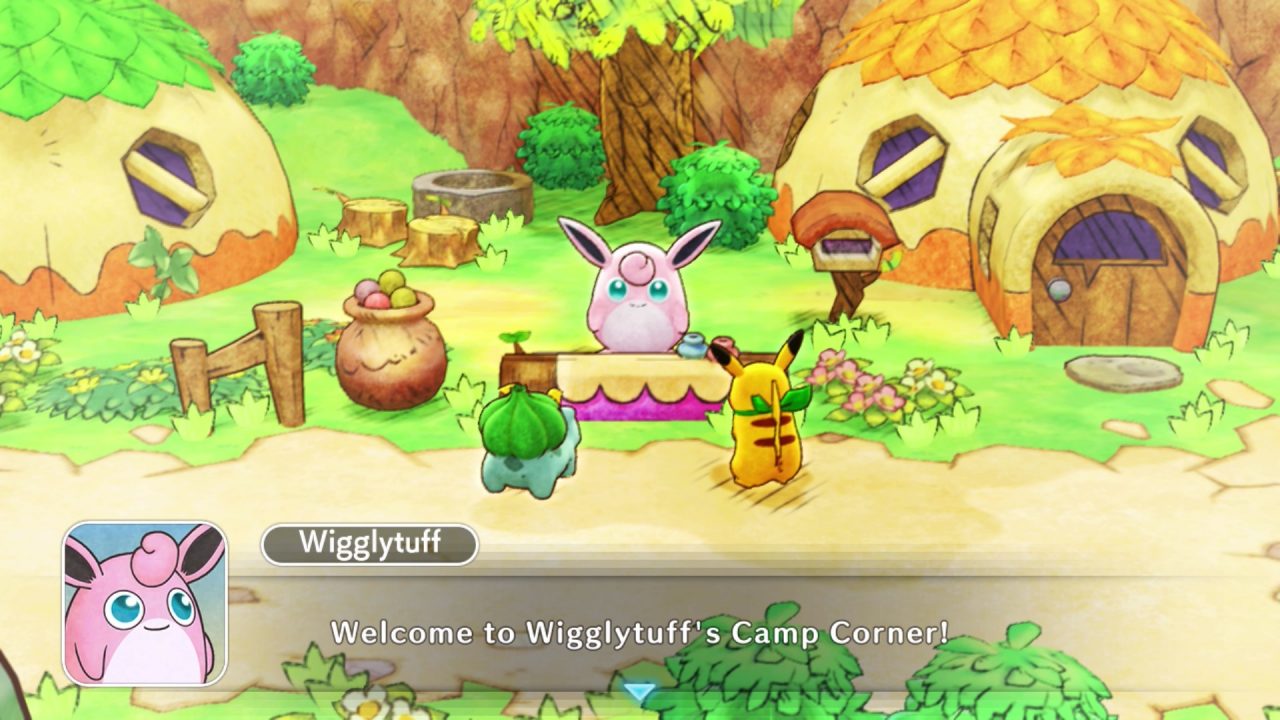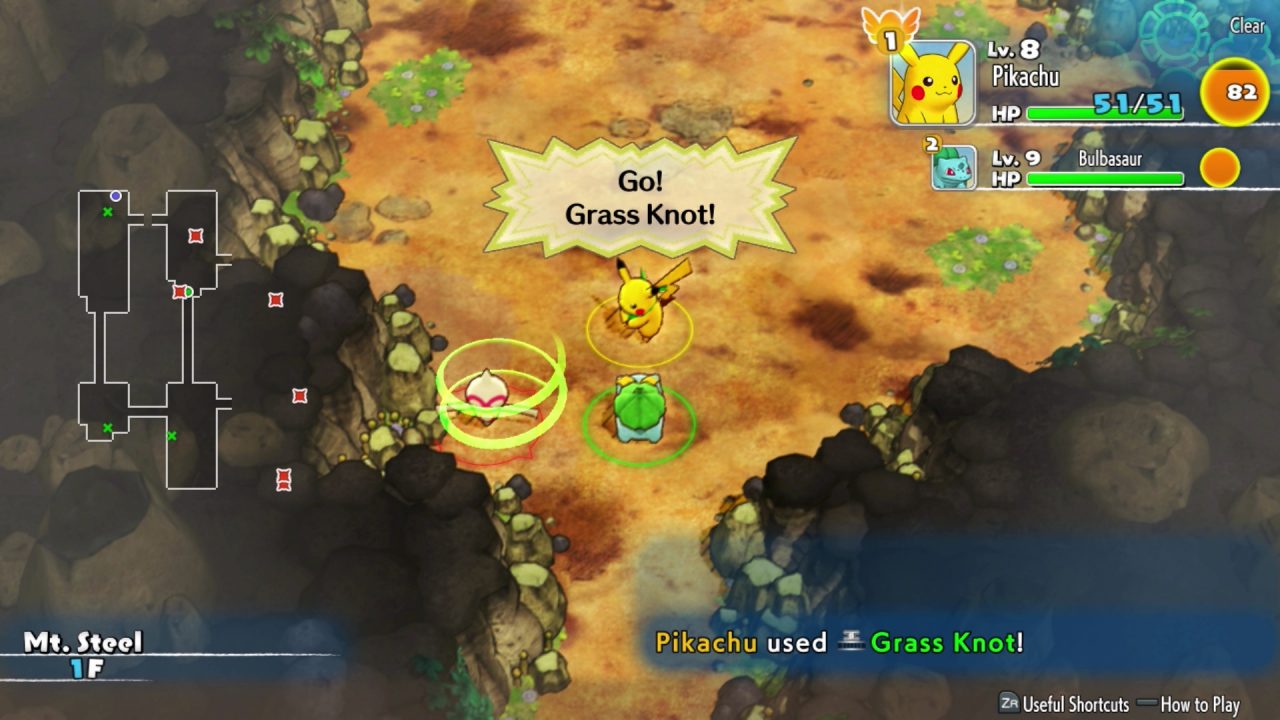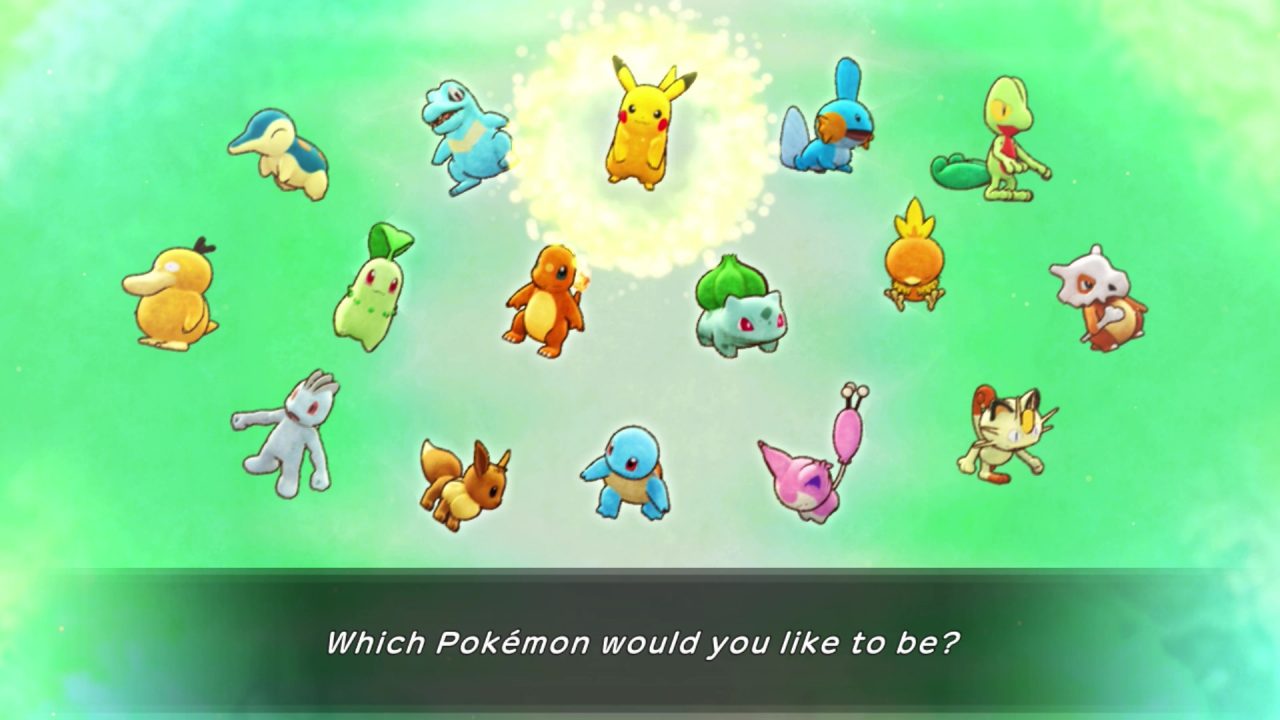While many do not know it, the Mystery Dungeon moniker is actually its own meta-franchise. These tile-based, Japanese roguelike titles from Chunsoft (now Spike Chunsoft) started with a Dragon Quest spin-off title (Torneko’s Great Adventure) in 1993. Today, the franchise has branched out to include an original series (Shiren the Wanderer), a Final Fantasy spin-off starring Chocobo, two Etrian Odyssey titles, and of course, Pokémon. While each game will feature a setting tied inextricably to its associated in-game world, the core mechanics of every Mystery Dungeon title are relatively similar: find the items, find the stairs, reach the end of the dungeon, and expect harsh punishments for failure.
And herein lies what I suspect is at the heart of the problem — at least for gamers outside of Japan. These games are a whole other genre, and while the “collect ’em all” philosophy is undoubtedly still present and attainable, the challenge level in terms of risk and reward is simply daunting. And for the few of us that are die-hard fans of the Mystery Dungeon games, it’s generally agreed upon that the Pokémon entries are among the easiest to complete, at least for the main plot. Therefore, Pokémon Mystery Dungeon: Rescue Team DX straddles the fence for uninitiated fans of the Pokémon games who will find it too hard and Mystery Dungeon fans who will find it too easy.
So the target audience is a bit blurry, a bit ill-defined. So what? Is the game still fun to play? Clearly some people think so, as the Pokémon Mystery Dungeon series has five main entries, most of which have been localized! In fact, this very title is a remake of the first game in the series: a blue/red pairing released in 2005. Pokémon Mystery Dungeon: Red Rescue Team was a Game Boy Advance exclusive, and its nearly-identical pair Pokémon Mystery Dungeon: Blue Rescue Team was exclusive to the then-new Nintendo DS. The series has apparently seen nothing but improvements since that first outing, though I will admit I am going in blind. I have plenty of experience with Shiren the Wanderer, but this is my first time going deep into what I will now abbreviate as PMD.

In each PMD, the game situates you as a human being who, through some unknown and mystical reason, transformed into a Pokémon. The circumstances around this transformation are different in each game and are often central to the game’s plot. In Rescue Team DX, you have no idea how you came to be the way you are, but that there is a sort of prophecy or legend relating to a human who became a Pokémon. Whether this legend refers to you specifically or not remains to be seen. What is apparent, however, is that on your verdant island home, natural disasters are occurring at a dangerous and accelerated rate. Your fellow Pokémon keep getting themselves trapped in various locales for various reasons. Through some auspicious circumstances, you and the first Pokémon who found you washed up on the island decide to join a special league on the island known as “Rescue Teams.” The name tells the story: sometimes, creatures need rescuing, and it’s up to you to accomplish it.
Said rescues, alongside some circumstances where you can impress Pokémon in battle, are how you “catch ’em all” in PMD. And while Mystery Dungeon DX is a remake of games from the third generation of Pokémon games (and yes, all 386 from those three gens are available to recruit!), there are a handful of additions specific to this remake. Most of them are in the form of new evolutions such as Eevee’s Glaceon, Leafeon, and Sylveon forms. However, Lucario (and Riolu) make an appearance in the game as well. As such, the gameplay loop is pretty simple, though it is story-driven for the first 20 hours or so. A specific Pokémon needs to be rescued. For various circumstances, other rescue teams have failed (or are actively competing with you as you descend into a cave or climb a mountain). You and your team head in, make it to the end, sometimes fight a boss, and rescue the poor trapped Pokémon. Rinse and repeat! Many, many times.
What makes the repetition so fun is the secret of the Mystery Dungeon formally itself. The deceptively simple movement patterns, the many items and their specific uses, the struggles with scarcity, and the risk of losing it all if you fail. I could say paragraphs more, but folks like myself, John Tucker, and Robert Steinman (see links to game reviews above) have already done so in great detail. The notable change to PMD is the shift in emphasis from equipment to skill improvements and changes. PMD is also more party-based than other Mystery Dungeon games, allowing teams up to eight — three from your actual team, and up to five you can rescue and recruit while in any given dungeon. In this way, it is resource-heavy.

And, dare I say, anyone who knows their stuff will find it pretty easy. Really, painfully easy. This may come off as boasting, but the fact is that I achieved everything in the game other than grinding out a max-rank rescue team (because it is an enormous waste of time). I died exactly once on the single hardest postgame dungeon (Purity Forest, 99 floors with no items, level reset, no teammates). Here’s the thing, though: I’m not boasting. I’m frustrated because the thrill of risk/reward in a roguelike is lost entirely when the risk is so abysmally low.
Even as I write this, I remind myself that I’ve watched friends and loved ones play the PMD games over the years and die, over and over, at one same dungeon. The persistent advantages (leveling up, using stat-up items, recruiting high-level Pokémon) won’t compensate for a basic lack of knowledge. And if you skip by those tutorial screens and don’t care to learn how the game works, you may fail. And I guess that’s fair? It’s not exactly an intuitive experience. One could argue that the strength/weakness system in the base Pokémon franchise is more intuitive, but only marginally so. You still have to memorize! If I set aside my dual-edged complaint regarding difficulty level, I can safely say that the game is still a joy to play; the thrill of facing down a boss at the end of a 30-floor dungeon with a rag-tag band of critters that are on their last oran berry? Priceless. And while I never did die, I will confess to a few close calls. Good effort, Deoxys!
In terms of game design and control, I found the UI and button layout for this Switch entry into the PMD series to be nearly perfect. It doesn’t take long to get down the shortcut windows, the lock-on mechanisms, the auto-run, the party AI features, and the customization options back at camp. Honestly, comparing how Spike Chunsoft handles the PMD games and how Nintendo themselves handle menus in, say, Pokémon Sword & Shield, I am confident in my evaluation that the PMD devs think more clearly about menu navigation than the main series developers.

Aesthetically, Pokémon Mystery Dungeon: Rescue Team DX delivers a beautiful palette of colors and sounds. The devs utilized a specific form of colorization for the Pokémon in cutscene events where one or more layers of color are predetermined for that entity. Then instead of a solid or gradient fill, there’s a sort of complex, colorful layer behind the Pokémon. It feels a little jarring when the Pokémon (say, Zapdos) flaps its wings and, while the black borders drawn are moving, the yellowish color inside stays still. It is trippy, but I have heard people critique this method as being lazy. I hear that, but I also note that there are over 400 Pokémon in this game, plus dozens of environments and hundreds of combat animations. I feel like the art is above “adequate.”
As for the music? My only complaint is that there’s no published soundtrack with this game! In fact, there hasn’t been a single music release for the entire PMD series. The closest thing for the whole series was actually for this game: a promotional giveaway managed by the official Pokémon Twitter account in early 2020, featuring seven songs from the game, pressed on Vinyl and CD. Nintendo manufactured and gave away ten of these, and that’s it. Can you detect my blood boiling from miles away? Of course you can. The music in these games, and specifically in Rescue Team DX, is genuinely enjoyable! There are many relaxing, simple environmental themes, for both the central town hub and the many dungeons. There are some fun, intense battle themes as well! Even the simplest melodies, such as the one used in your main character’s dream sequences, are imprinted in my mind as something I want to hear again and again. So, erm … dear Nintendo, Pokémon Company, and Spike Chunsoft: if it isn’t too much to ask, how about a digital compilation or box set for all the Pokémon Mystery Dungeon music? Pretty please? I already made my wish to Jirachi for this one!
All told, even with the quirky middling difficulty making this one hard to write home about, I still think Pokémon Mystery Dungeon: Rescue Team DX is a fun game to play through. The postgame can be somewhat monotonous, but the main story keeps things going. Seriously, the plot is simple, but the dialogue between all of these Pokémon makes for a great experience. The mix of mature themes — life and death, protection and abandonment — with the childlike wonder of all things Pokémon keep the mind focused on the purpose of the quest, even when the quest itself is a heavy strain (or a simple frolic) for some players. If you’ve yet to try Mystery Dungeon games but want a better understanding, this might be a great starting place! If you’ve played other Pokémon Mystery Dungeon entries and appreciated their balance of challenge and storytelling, you’re likely to enjoy this remake of the one that started it all.


